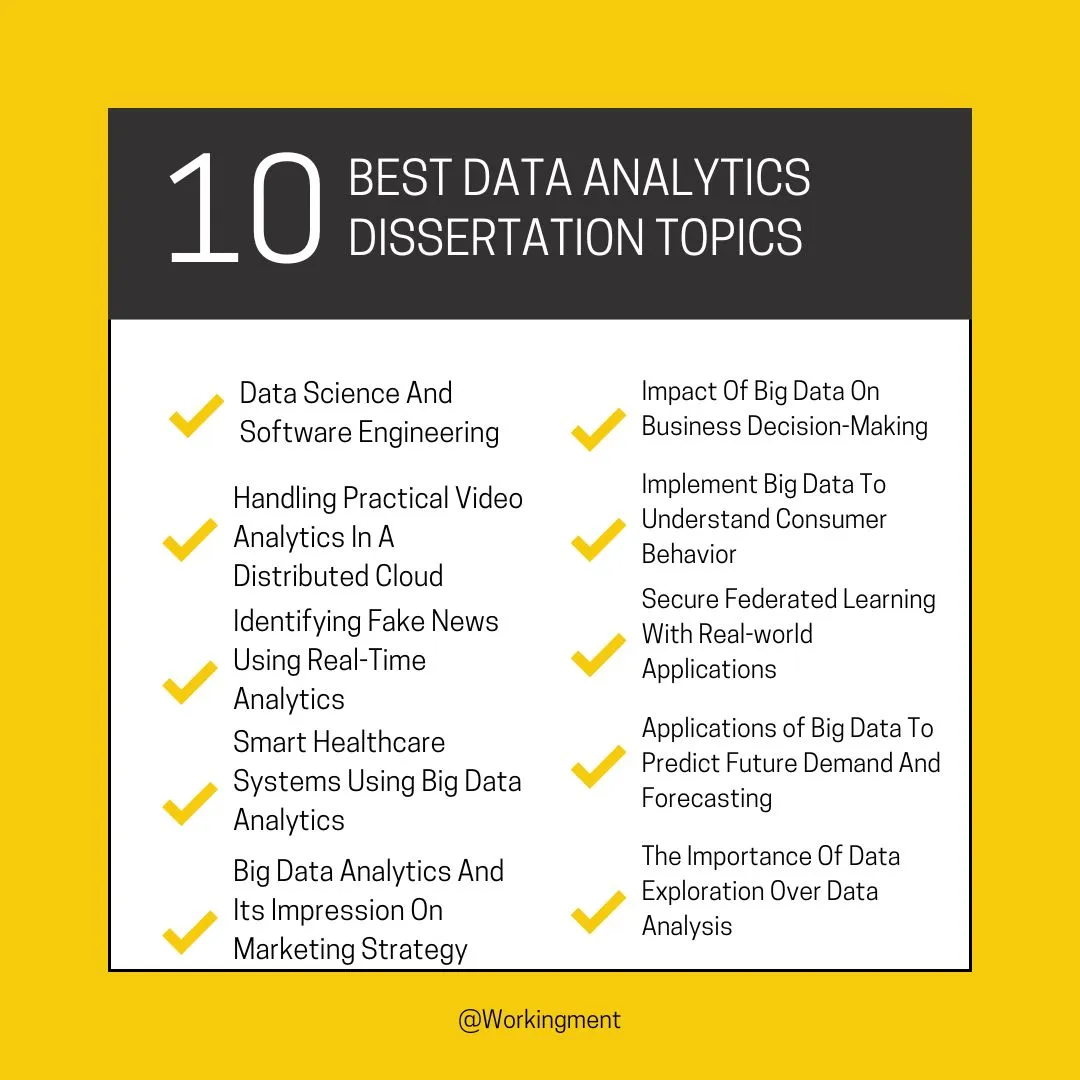What is Doctoral Dissertation?
A doctoral dissertation is one of the longest pieces of writing, in which you are the author, and you need to provide a ...

As businesses seek to use data to accelerate digital and industrial transformation, companies around the world are looking for skilled and talented data professionals who can leverage meaningful insights extracted from data to improve business productivity and help achieve company goals.
Recently, data science has emerged as a viable employment option. Nowadays, colleges and institutions provide a variety of data science and big data courses to educate students for success in the technology business.
Participating in or taking on various data science initiatives, with the support of a Dissertation Helper, is the best way to strengthen your resume. In this blog, we present a list of the 10 best data analytics dissertation topics.
Data science is the study of using data in various processes and their algorithms. If understood in simple language, it involves investigating, analyzing, collecting, and interpreting sets of facts and numbers. It helps you uncover the knowledge within you and its deeper points, so that you can make effective decisions and solve real-world problems more easily. Also, it helps you find solutions to MAL7504-E Applied Artificial Intelligence and Data Analytics through various strategies of different subjects like Artificial Intelligence, Mathematics, and Computer Engineering.
This holds importance because it will help you combine your technology and tools so that you can easily generate meaning from the research.
Data science gives you the power to look deeper, and also allocates resources so you can make stronger decisions. With its help you can make accurate predictions.
This will help you increase your efficiency in data science, because it will provide you with a SWOT analysis, which includes weaknesses, strengths, opportunities and threats. Apart from this it also improves your learning ability.
We have given some benefits here which you can use in writing your research paper. This helps you in your data science dissertation, if you still face any problem then you can take help from our expert assignment helper.
Below we have given a list of Data Science dissertation topics which will help you in making your research paper.
Next, let’s dive into a curated list of compelling data science dissertation topics to help you get started on your research journey.

Below we provide the list of the 10 best data analytics dissertation topics and thesis -
Software engineering and development are an important part of data science. Skilled data professionals must learn and explore the possibilities of various technical and software skills to perform critical AI and big data tasks.
With the increasing dependence on the Internet, video sharing has become a way of exchanging data and information. Internet of Things (IoT) implementation, telecom infrastructure, and operators have a very important role to play in generating insights from video analytics.
From this perspective, many questions need to be answered, such as the efficiency of existing analytics systems, the changes that occur when real-time analytics are integrated, etc. For those exploring these questions in academic research, seeking help with a dissertation can provide valuable insights and support in crafting a thorough analysis.
The circulation of fake news has become a pressing problem in the modern era. Data collected on social media may appear legitimate, but sometimes it is not. The sources providing the data are unauthenticated most of the time, making it a crucial issue that needs to be addressed.
Big data analytics plays a key role in making healthcare more efficient, accessible, and cost-effective. Big data analytics improves the operational efficiency of smart healthcare providers by providing real-time analytics.
It improves the capabilities of intelligent systems by using short-term data-driven insights, but there are still specific challenges in this area that have yet to be addressed.
The advent of data science and big data analytics has completely redefined the marketing industry. It has helped companies by offering valuable information about their current and future customers.
However several issues such as the existence of excess data, integration of complex data into customer journeys, and complete data privacy are some of the branches that are yet to be explored and need immediate attention.
Current studies indicate that big data has transformed the way business managers and leaders make critical decisions relating to business growth and development. It allows them to access objective data and analyze market environments, allowing companies to adapt quickly and make decisions faster.
Working on this topic will help students understand the current market and business conditions and help them analyze new solutions. For those needing assistance with this complex subject, services, like Do My Dissertation For Me in the UK, can provide the necessary support to complete an insightful dissertation.
To understand consumer behavior, big data is used to analyze data points that describe a consumer's journey after purchasing a product. The data provides a clearer picture to understand specific scenarios. This topic will help in understanding the problems that companies face in using the knowledge and developing new strategies in the future to generate more return on investment.
Federated learning is a technique that trains an algorithm on multiple servers and decentralized edge devices. This technique can be adopted to build models locally, but it is not yet clear whether it can be deployed at scale or not, across multiple platforms with high-level security.
Predictive analytics in data science has become an integral part of decision-making and demand forecasting. Working on this topic will allow students to determine the importance of high-quality historical data analysis and the factors driving increased demand among consumers.
Exploration helps your data analysts and others really see patterns in the data that might not otherwise be known if they were moved into a huge spreadsheet.
Data exploration and visual analytics tools encourage their users to explore the data in any visualization. It democratizes access to your data. Its users can create their own questions.
Data exploration is used in a wide range of industries, including engineering, insurance, and education.
> Software development
> Healthcare and medicine
> Finance
So far we've told you what data analysis is, now we'll tell you how you can write about it in a way that engages your readers and has a significant impact. I am here to tell you what points you need have made.
Planning your data analysis paper is an important point for its successful outcome:
Your first objective is to establish a strong foundation for the analytical journey. After that you have to write down your data science research.
You should outline your content and define key concepts. After this, you should present an overview of the characteristics of your data collection, highlighting its nature, its sources and any notable features.
This is an important step in the data analysis process, which ensures the integrity and reliability of your findings. To organize your data science research, it is important to write down the data published on your points. Any problems that arise while reading your research have to be dealt with in your planning.
When analyzing your data you will need to carefully examine your research and look deeper to analyze its usefulness.
You can easily break this process into two parts:
> Creating clear and concise visualizations
Present your findings effectively through visualization. Graph your data to visually show trends and patterns. Present your data clearly through pictures.'
> Interpreting and Interpreting Results
Go beyond mere presentation by providing practical explanations by hiring data analysis dissertation services. You should show the importance of the findings of your topic in your research context. Also explain the implications of the patterns or relationships you observe. You guide your readers through the relevance and impact of your data analysis.
The data analysis part of a dissertation section is similar to choosing the right tools for an artistic masterpiece. Carefully evaluate qualitative and quantitative approaches, ensuring that their fit is consistent with your data.
> Qualitative Analysis
Thematic Analysis: Imagine your data science data as a novel and the best analysis as a tool to uncover its hidden chapters. Analyze your topics and patterns.
> Quantitative Analysis
Descriptive Statistics: Create a visual picture of your data through measures such as median, mean, and mode. this will make your topic more interesting.
When thinking about your topic's conclusion and essay research, it's like putting the pieces of a puzzle together to figure out what you want to say. You should always be aware of any limited or possible precedents in your study, with the help of this you can make your research more reliable. Before seeing the results, you should take help from those who have achieved similar results, so you will know where your work fits.
Follow the points given below to improve your writing:
Analyzing the data you have conducted is important to ensure the summation of the research and its impact and effectiveness. By revising your research data, you refine the clarity and coherence of your analysis.
You may receive feedback on your research from your own colleagues, advisors or dissertation data analysis services that provide valuable perspectives. Address common writing deficiencies, such as grammatical errors or unclear expressions, to make your chapter appear polished and professional.
Writing a great data analytics dissertation requires careful planning, thorough research, and attention to detail. By following the steps outlined above, you can ensure that your dissertation is well-organized, informative, and relevant to your chosen data analytics dissertation topics.
If you need further assistance, our experts are here to provide guidance and support throughout your dissertation journey, from choosing a topic to final proofreading.
Remember, success in your dissertation depends on clarity of purpose, careful research, and strong execution. With the right approach, you will not only complete your dissertation on time but also provide valuable insights into the field of data analytics.
Software engineering and development are an important part of data science. Skilled data professionals must learn and explore the possibilities of various technical and software skills to perform critical AI and big data tasks.
Here are some engaging topics for data analysis, listed from A to Z: Autocorrelation , CADStat , Classification and Regression Trees, Conditional Probability, Confidence Intervals , Confounding , Controlling for Natural Variability.
Federated learning is a technique that trains an algorithm on multiple servers and decentralized edge devices. This technique can be adopted to build models locally, but it is not yet clear whether it can be deployed at scale or not, across multiple platforms with high-level security.
When exploring potential dissertation topics, aim to focus on areas such as predictive analytics, machine learning techniques, or big data governance. Each of these domains presents distinct challenges and opportunities for innovative research, allowing you to make a significant contribution to the field.
Let's Book Your Work with Our Expert and Get High-Quality Content

Loved reading this Blog? Share your valuable thoughts in the comment section.
Add comment